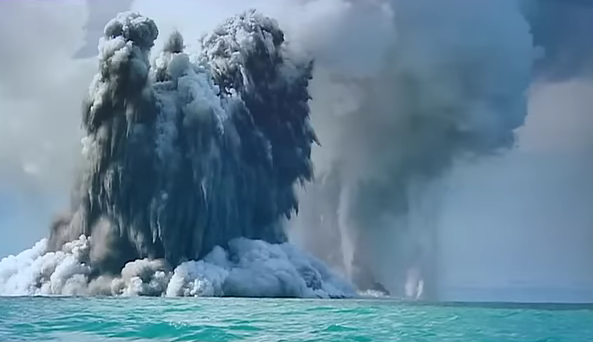The volcanic eruption was notable as the release of sulfur gases from Tonga was less than normal, while instead releasing large amounts of water (in the form of vapor), which increased the CO2 concentration and may result in global warming.
The study has received zero attention in the United States.
According to a recent study published in the journal Nature Climate Change, the eruption of the Tonga volcano in January 2022 caused temporary warming over the Pacific Ocean.
The phenomena will cause the Earth to warm over the next decade, and scientists believe it could push us over the threshold of 1.5 degrees Celsius set by the U.N.
SyFy.com has written about the case, which has received zero attention in the U.S., especially considering how «extreme weather» dominates the news.
Fox Weather and Global News have published videos about the study on YouTube, which you will find at the end of the article.
According to the Bjerknes Center for Climate Research in Norway, volcanic eruptions usually lead to cooling of the Earth’s surface:
«Volcanic eruptions are important for changes in weather and climate, especially in the first couple of years after the eruption. The most crucial climate effect of volcanic eruptions is due to the emission of sulfur gases, which convert into aerosols. The haze of aerosols reflects some incoming solar radiation, thus cooling the Earth’s surface.»
The volcanic eruption in Tonga was remarkable when, in addition to the usual gases, it released large quantities of water in the form of steam.
Bjerknes Climate Research writes (in 2021, before the study):
«Volcanoes also release water vapor and carbon dioxide. However, due to the large amounts already in the atmosphere, even a large volcanic eruption will not lead to a noticeable change in the CO2 concentration globally. Even so, on very long time scales (thousands to millions of years), eruptions from many giant volcanoes may have raised the concentration of CO2 in the atmosphere enough to cause global warming.»
The volcanic eruption in Tonga sent an estimated 146 metric megatons (1 Mt. is one million metric tons) of water into the stratosphere, several kilometers above the planet’s surface, writes SyFy:
«That water vapor acts as a greenhouse gas, trapping heat and raising the average temperature over the Pacific. That warming is temporary, but it’s an added pressure on an already strained system.»
A closer look at the study does not explain when global warming from the volcano will begin or if it has already begun. We also note that the study’s publish date was January 12th, 2023, but only now do we notice it has attracted some interest, however, only from a few.
Meteorologist Amy Freeze with Fox Weather talks to researcher Sam Purkins at the University of Miami, who says that emissions of sulfur gases from Tonga were less than usual and that more water vapor increased the CO2 concentration.
He explains that both the strength of the volcanic eruption and its depth were two factors that caused the amount of water to be so large.
2022 Volcanic Eruption In Tonga Affected Climate Around The World, Study Says.
Global News has also published a video on YouTube and writes that the volcanic eruption in Tonga may have fueled the heat waves this summer. Global News reports in the introduction:
“From Canada’s historic wildfire season to sweltering heat waves gripping the U.S., southern Europe, and North Africa, 2023 is shaping up to be one of the hottest years ever. Scientists have long sounded the alarm about the worsening climate crisis, warning that humans burning fossil fuels contributes to the warming planet.
But as Eric Sorensen explains, there’s evidence Tonga’s massive volcano eruption in 2022 is also playing a role in this summer’s heat.”
Tonga volcano eruption may have role in fueling summer heatwaves.
Norwegian American Elisabeth Rooney is the USA correspondent for Document News. She lives in South Florida.




